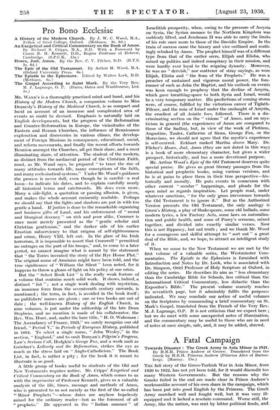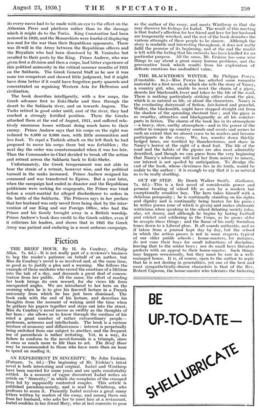A Fatal Campaign
THE full story of the Greco-Turkish War in Asia Minor, from 1920 to 1922, has not yet been told, for it would discredit too many Western Governments. But the reasons why the Greeks failed in the end are made clear in Prince Andrew's workmanlike account of his own share in the campaign, which has been put into good English by the Princess. The Greek Army marched well and fought well, but it was very ill- equipped and it lacked a resolute command. Worse still, the Army, like the nation, was rent by bitter political feuds, and
its every move had to be made with-an eye to the effect on the Athenian Press and platform rather than to the damage which it might do to the Turks. King Constantine had been restored in 1920, and the Monarchists were fearful of displaying less zeal for the war than their Republican opponents. There was in the Army between the Republican officers and the Royalists who had been dismissed by M. Venizelos but recalled to their posts by the King. Prince Andrew, who was given first a division and then a corps, had bitter experience of this political animosity in the critical summer months of 1921 on the Sakharia. The Greek General Staff as he saw it was none too competent and showed little judgment, but it might have done better if it could have forgotten party quarrels and concentrated on regaining Western Asia for Hellenism and civilization.
The book describes intelligently, with a few maps, the Greek advance first to Eski-Shehr and then through the desert to the Sakharia river, and on towards Angora. The Turks retired in good order until, east of the river, they had reached a strongly fortified position. There the Greeks attacked them at the end of August, 1921, and suffered rela- tively enormous losses without doing much harm to their enemy. Prince Andrew says that his corps on the right was reduced to 8,000 or 9,000 men, with little ammunition and less food. To repel a Turkish attack on the left flank he had proposed to move his corps there but was forbidden ; the next day the order was countermanded when it was too late. Then the Commander-in-Chief decided to break off the action and retreat across the Sakharia back to Eski-Shehr.
Unfortunately, the Greek temperament was not able to bear the strain of a retreat, however wise, and the political turmoil in the ranks increased. Prince Andrew resigned his command and was transferred to Epirus. But a year later, when the campaign had ended in disaster and the Republican politicians were seeking for scapegoats, the Prince was tried before a court-martial for alleged disobedience to orders in the battle of the Sakharia. The Princess says in her preface that her husband was only saved from being shot by the inter- vention of our King and our Foreign Office, who had the Prince and his family brought away in a British warship. Prince Andrew's book does credit to the Greek soldier, even if it criticizes his leaders, and shows that in 1921 the Greek Army was patient and enduring in a most arduous campaign.

































 Previous page
Previous page